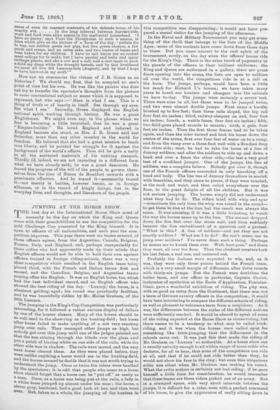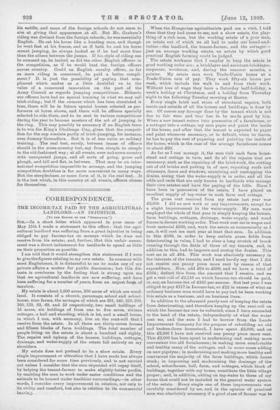JUMPING AT THE HORSE SHOW.
THE beet day at the International Horse Show must of necessity be the day on which the King and Queen Come with their grandchildren to see the competition for the gold Challenge Cup presented by the King himself. It is Open to officers of all nationalities, and each year the com- petition improves. This year there were six teams entered, of three officers apiece, from the Argentine, Canada, Belgium, France, Italy, and England, and, perhaps unexpectedly for those critics who had apparently made up their minds that English officers would not be able to hold their own against officers trained in foreign riding-schools, there was a very close competition which resulted in the English team being Placed third, with the French and Italian teams first and second, and the Canadian, Belgian, and Argentine teams coming after the English. It was an English horse, too, which had the best individual record, and an English officer who showed the best riding of the day. 'Luxury,' the horse, is a ehestnut gelding, aged ; his round was practically faultless, and be was beautifully ridden by Mr. Malise Graham, of the 16th Lancers.
The jumping in the King's Cup Competition was particularly interesting, for it followed a rather curious display of failure hY one of the hunter classes. Many of the horses should be as well used to the show-ring as the bunting-field ; but horse after horse failed to make anything of a not very exacting Jump over rails. They managed other jumps as high, but nobody got over this jump until one of the judges pointed out that the sun shining through the blinds over the glass roof pat a Patch of blazing white on one Bide of the rails, while the other aide was in shadow. The rails were moved, and the very next horse cleared them. As they were placed before, they Were unlike anything a horse would see in the hunting-field, and the horses seemed to decide that it was not worth trying to understand the jump. Once or twice the riders were baulked by the spectators; it is odd that people who come to a horse show should forget that a horse can be "put off" as easily as a man. Once, as a horse was being put at the rails, a lady in a white dress jumped up almost under his nose ; the horse, a clever grey, hesitated, had a good look at her, and then went Over. But, taken as a whole, the jumping of the hunters in this competition was disappointing; it would not have prea pared a casual visitor for the jumping of the afternoon.
In the Naval and Military Tournament you may get some- thing of the thrill that belongs to the lists of the Middle Ages; some of the contests have come down from those days to these. But you come nearest to the real spirit of the tournament, surely, on the day when the officers' teams ride for the King's Cup. There is the extra touch of pageantry in the parade of the officers in their brilliant uniforms; the King and Queen are enthroned in a gallery, there are great doors opening into the arena, the lists are open to soldiers all over the world, the competitors ride in at a call on the horn. The jumps, perhaps, would have been a little too much for Richard L's horses; we have taken many years to breed our hunters and chargers into the animals we have to-day. The jumps were certainly a severe teat. There were nine in all, but three were to be jumped twice, and two were almost double jumps. First came a hurdle, brushed up to five feet; then three rails sloped, the top rail four feet six inches; third, railway-sleepers on end, four feet six inches; fourth, a wattle fence, four feet six inches; fifth, two field-guns placed muzzle to muzzle; sixth, a gate, four feet six inches. Then the first three fences had to be taken again, and then the rider turned and took his horse down the centre of the arena, first over four feet of water on to a ramp, and from the ramp over a three-foot wall with a five-foot drop the other side; next, he had to take his horse at a line of dummy soldiers, and after the soldiers to ride up and down a bank and over a fence the other side,—the last a very good test of a confident jumper. One of the jumps, the line of soldiers, was a complete failure. Nobody got over it, though one of the French officers succeeded in only knocking off a bead and body. The line was of dummy Grenadiers in scarlet, with bearskins, and they came to pieces, if they were touched, at the neck and waist, and then rolled everywhere over the floor, to the great delight of all the children. But it was not serious jumping. The horses simply did not understand what they had to do. The riders tried with whip and spur —sometimes the only time the whip was raised in the round— to get them to rise at the line, but the result was always the same. It was amusing, if it was a little irritating, to watch the way the horses came up to the line. The animal dropped down the five feet over the stone wall, and then suddenly became the live embodiment of a question and a protest. "What is this ? A line of soldiers—mid yet they are not exactly soldiers What am I to do? He can't mean me to jump over soldiers ? I've never done such a thing. Perhaps he means me to knock them over. Well, here goes," and there they went, all over the floor. Then the obedient creature took his last fence, a real one, anti, cantered out.
Probably the Italians were expected to win, and, as it was, they were only three points behind the French team, which is a very small margin of difference after three rounde with thirty-six jumps. But the French were doubtless the better team, and one officer in particular, Captain Cariou, instructor of equitation at the took. d'Application, Fontaine- bleau, gave a wonderful exhibition of riding. The pity was, with so good an entry from the Continent, that there was not a team of German cavalry officers in the competition ; it would have been interesting to compare the different Nehools of riding, as well as pleasant to welcome a team from a neighbour. As it was, the differences between the styles of the different nations were sufficiently marked. It would be absurd to speak of some of the riding expected at the Horse Show as circus-riding, but there seems to be a tendency to what may be called trick-
riding, and it was when the horses were called upon for something like trick-jumping that the differences in the schools came out. It was just this that made the riding of Mr. Graham on ' Luxury ' so noticeable. At a horse show one is usually unlucky enough to sit within range of some (laic who declares, for all to hear, that none of the competitors can ride at all, and that if be could not ride better than they, be would not show his face in the ring ; but even this ubiquitous critic was silent when Mr. Graham was making his round.
What the critic notices is certainly not bad riding ; if he gave himself a little time for consideration, he would remember
that these teams are three riders picked out of an army. But in a cramped space, with very short intervals between the jumps, it is difficult for a rider, even with a perfect command of his horse, to give the appearance of really sitting down in
his saddle, and some of the foreign schools do not seem to aim at giving that appearance at all. But Mr. Graham's riding was distinct from the foreign schools; be was essentially English. He sat his horse like a bunting man, and though Le went fast at his fences, and as if both he and his horse .meant jumping, be always looked as if he had more time than the others between the jumps. If his style of riding can be summed up, he looked, as did the other English officers in the competition, as if he would beat the foreign officers across country. Could an English cavalry officer, so far as mere riding is concerned, be paid a better compli- ment ? It is just the possibility of paying that com- pliment which makes us a little doubtful as to the value of a rumoured innovation on the part of the Army Council as regards jumping competitions. Hitherto our officers have had no special training in what we may call trick-riding; but if the rumour which has been circulated is true, there will be in future special horses selected as per- formers at horse shows, and there will be officers specially selected to ride them, and to be sent to various competitions during the year to become masters of the art of jumping in the ring. This may possibly be necessary if an English team is to win the King's Challenge Cup, given that the competi- tion for the cup consists partly of trick-jumping, for instance, over dummy'Grenadiers. But it is of less value as militwry training. The real test, surely, between teams of officers should be the cross-country test, say from steeple to steeple in the old-fashioned way ; at all events, over unknown country with unexpected jumps, and all sorts of going, gram and plough, and hill and flat, in between. That may he tin inter- national competition impossible to arrange, and the jumping competition doubtless is far more convenient in many ways. But the steeplechase, or some form of it, is the real test, it is the test which, in this country at all even La, officers choose for themselves.











































 Previous page
Previous page